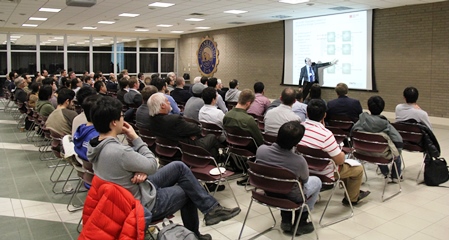
Rik De Doncker, director of the E.ON Energy Research Centre at RWTH Aachen University delivers a talk on power electronics as an enabler in future energy systems.
With a strong and growing core of researchers and industrial partners focusing on smart grid technologies and power electronics, the University of Alberta Department of Electrical and Computer Engineering recently hosted a smart grid workshop with an international slate of leading researchers and industry representatives.
Held in collaboration with RWTH Aachen University, the event drew industry and international researchers together to strengthen connections and establish collaborative research projects, under the umbrella of the U15-U20 universities groups in Canada and Germany, and under an International Energy Co-operation Program the Faculty of Engineering and RWTH Aachen signed in 2007.
Panel discussions and presentations touched on areas such as soft power grid solutions, distributed generation, and the continuing evolution of power systems. Speakers included international industry representatives from GE Energy Management, Toshiba, and Siemens as well as U of A research partners like EPCOR and the Alberta Electric System Operator.
John McDonald, GE Energy Management's director of technical strategy and policy development, said attending workshops such as this helps build connections between industry and universities and helps draw a clearer picture of local markets.
"There's no question industry looks to partner with universities," said McDonald, a former president of the IEEE Power and Energy Society who delivered a presentation on the future of energy and smart grids. "The more [events] like this you hold, the more aware we are of what the hot issues are locally. We're a multinational company, but we don't know until we're meeting with people in different places and have discussions with them what the regional differences and needs are."
Rik De Doncker, director of the E.ON Energy Research Centre at Aachen delivered a keynote address detailing radical changes to power generation and distribution underway in Germany, due to market liberalization and the rapid growth of renewable energy sources as the country races to meet CO2 emission reduction targets.
De Doncker promoted a completely transformed system that focuses on DC current rather than AC in order to meet future energy demands.
He said that travelling to Edmonton with a team of professors and research associates and meeting with the U of A engineering researchers and industry partners was rewarding.
"On the technical side, I find that even the German companies here are talking more openly about the opportunities of new technologies than we do in Germany," he said.
He added that the take-away form the workshops, held Feb. 26 and 27, inspire confidence that researchers and industry can work in unison to develop a more flexible smart grid system.
"What I learned from the presentations here is about the issues utilities have to deal with here and the fact that Canada is following very quickly in the automation of the energy sector. That's very good because I think Canada is much closer to Germany in the development of the smart grid.
"The U of A electrical energy systems group has definitely built up a strong program in power electronics and this has been a great opportunity for researchers to exchange ideas with each other and with industry and business partners…we are not going to do this alone. We need researchers all over the world working on this technology."